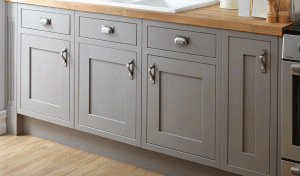 When your kitchen cabinets begin looking shabby or out of place, they’re a top priority for your kitchen contractor. They’re a key part of your kitchen, both in functionality and aesthetic appeal, and you want to make sure you’re getting the most out of them.
When your kitchen cabinets begin looking shabby or out of place, they’re a top priority for your kitchen contractor. They’re a key part of your kitchen, both in functionality and aesthetic appeal, and you want to make sure you’re getting the most out of them.
So, you’re left with two major options. Replacing your cabinets involves installing brand new cabinets, and that’s what most people jump to as their primary option. But did you know that refacing cabinets is sometimes an option as well? It’s a more cost-effective and sustainable approach, and will give you the look of custom cabinets while fitting in your budget.
Not all cabinets can be refaced, however. If you’re considering whether to replace or reface your kitchen cabinets, here are some key indicators that replacement would be necessary:
Cheap Cabinets
Sometimes, when you move in to a new home, you’ll find that the previous owner has installed cheap cabinets. Cabinets made of particle board are much more difficult to reface, even with proper reinforcement. It’s best in that situation to replace the whole lot.
Severe Damage
Rotting wood. Severe water damage. Mold. Termites. Plenty of things can happen to your wooden kitchen cabinets, and some of it can damage them beyond the possibility of refacing. It’s rare that all cabinets are damaged beyond repair, though – it may be possible to mix and match replacing and refacing.
Metal Cabinets
Metal cabinets, or metal cabinet frames, are much more difficult to work with when it comes to refacing. They used to be all the vogue – vermin-proof and modern looking and all that. They’re not nearly as possible today as they used to be, but there are still some lying about, and they often cannot be refaced.
A Complete Kitchen Layout Change
If you’re undergoing a complete kitchen remodel, and will be moving cabinets here and there, it makes much more sense to replace them. Trying to fit an old, refaced cabinet into a new place is often like putting a square peg in a round hole – it just ends up not working and frustrating everyone who tries. It’s better to get entirely new cabinets in this case.
 If you’ve never hired a kitchen contractor before, you may not know what the important questions to ask are. Judging by online reviews or websites is a great starting point, but you should take advantage of consultations and face-to-face meetings with your contractor to ask key questions and learn more about them and their work. Here are a few important questions to ask:
If you’ve never hired a kitchen contractor before, you may not know what the important questions to ask are. Judging by online reviews or websites is a great starting point, but you should take advantage of consultations and face-to-face meetings with your contractor to ask key questions and learn more about them and their work. Here are a few important questions to ask:



 Copyright © 2024 · Solid Surface · Web design by
Copyright © 2024 · Solid Surface · Web design by